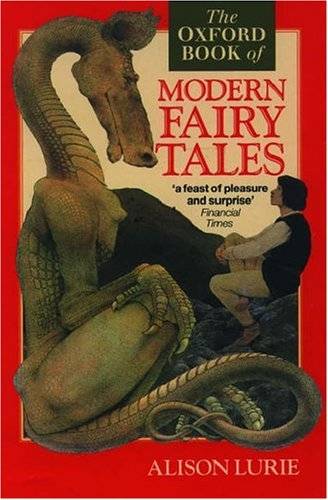

The Oxford Book of Modern Fairy Tales
by Robert Louis Stevenson and Bernard Malamud and Walter de la Mare and Alison Lurie and Tanith Lee and Charles Dickens and John Ruskin and H.G. Wells and Ursula K. Le Guin and George MacDonald and Oscar Wilde and Kenneth Grahame and Philip K. Dick and Jane Yolen and T.H. White and Sylvia Townsend Warner and Nathaniel Hawthorne and Frank R. Stockton and Howard Pyle and Isaac Bashevis Singer and Louise Erdrich and Angela Carter and Lord Dunsany and Laurence Housman and Donald Barthelme and E. Nesbit and Jay Williams and Carl Sandburg and Richard Kennedy and L. Frank Baum and James Thurber and Joan Aiken and John Collier and Lucy Clifford and Richard Hughes and Naomi Mitchison and Frances Browne and Juliana Horatia Ewing and Mary De Morgan and Jeanne Desy and Catherine Sinclair
Most people think of fairy tales as having been created anonymously and almost magically long ago, and later discovered and recorded by scholars such as the Brothers Grimm. In fact original fairy tales are still being written. Over the last century and a half many well-known authors have used the characters and settings and themes of traditional tales such as 'Cinderella', 'Hansel and Gretel', and 'Beauty and the Beast' to produce new and characteristic works of wonder and enchantment. The Oxford Book of Modern Fairy Tales brings together forty of the best of these stories by British and American writers from John Ruskin and Nathaniel Hawthorne to I. B. Singer and Angela Carter. These tales are full of princes and princesses, witches and dragons and talking animals, magic objects, evil spells, and unexpected endings. Some of their authors, like John Ruskin and Oscar Wilde, use the form to point a social or spiritual moral; others such as Jeanne Desy and Richard Kennedy, turn the traditional stories inside out to extraordinary effect. James Thurber, Bernard Malamud, and Donald Barthelme, among many others, bring the characters and plots of the traditional fairy tale into the contemporary world to make satiric comments on modern life. The literary skill, wit, and sophistication of these stories appeal to an adult audience, even though some of them were originally written for children. They include light-hearted comic fairy stories like Charles Dickens's 'The Magic Fishbone' and L. F. Baum's 'The Queen of Quok', thoughtful and often moving tales like Lord Dunsany's 'The Kith of the Elf Folk' and Philip K. Dick's 'The King of the Elves', and profoundly disturbing ones like Lucy LaneClifford's 'The New Mother', and Ursula Le Guin's 'The Wife's Story'. Together they prove that the fairy tale is not only one of the most popular and enduring forms, but a significant and continually developing part of literature.
Release Date:
September 28, 1994

